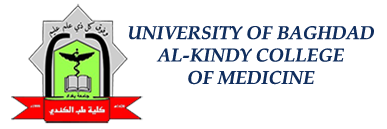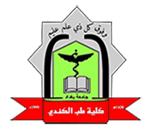The curriculum of Al-Kindy College of Medicine is principally an integrated, student-centered, introducing varieties of delivery modes, communication skills and early clinical exposure early in the program (year two) and expanding the clinical skill lab sessions, at the same time the students are given the opportunity for self-directed learning, as well as the student and lecturers are requested to give feedback on the curriculum and the teaching learning methods.
Course Description
INTEGRATED MODULE-BASE CURRICULUM
Education program assessment
Worldwide, many accreditation bodies are established to ensure that the medical schools have fulfill the requirement of accreditation process, our college follow the guideline of the Iraqi accreditation committee for medical colleges which is approved by WFME . The philosophy of the new curriculum of the Al-Kindy College of Medicine, University of Baghdad, is based on solid scientific foundation imbued with strong humanistic values. The faculty adopted a hybrid learning approach to implement its curriculum and the teaching-learning techniques and assessments methods used in the faculty reflect this approach.
The Six Year Medical Program (M.B.Ch.B)
Divided Into:
– Year I as Preparatory Year.
– Year II and III as Preclinical Years
– Year IV, V and VI as Clinical Years
The Same Time the Whole Program Represent Two Phases,
-Phase I: Includes Years I, II and III
– Phase II: Represent Years IV, V and, V1.
PHASE I
Year I : comprise of:
Semester I Which Includes:
- Preparatory I (medical physics and information technology sciences , human rights ,library and computer sciences)
- Preparatory II (molecular biology, foundation of medicine and genetics)
Semester II:
General I module (deals with normal impacts) and general ii modules (deals with a abnormal impacts of basic pathology, microbiology and pharmacology) and ethical module.
Year II and III Represent:
- Organ /system based modules.
- Early clinical exposure and problem based learning packages are prepared to be delivered during years II and III
PHASE II
REPRESENT DISCIPLINE BASED POSTINGS.
- Year IV: focuses on introduction to basic clinical skills and knowledge.
- Year V: represents introduction to different specialties.
- Year VI: concentrates on consolidation of the clinical skills and knowledge.
At the end of each academic year the Curiculum Committee of Al-Kindy College update the previous years, according to the feedback from the students and the faculty members aiming perfection.
STUDENTS ASSESSMENTS
Phase II:
A formal examination is conducted at the end of each posting and these posting examination are both promotional and summative in nature.
The continuous assessments: forms a significant part of the student’s evaluation in all the phases. This assessment is based on the student’s attitudes, their performance during modules or clinical postings.
An attendance of more than 90% and proper attitude are mandatory pre-requisite to sit in the examinations. As shown in the below table as example
STUDENTS ASSESSMENTS
Phase II:
A formal examination is conducted at the end of each posting and these posting examination are both promotional and summative in nature.
The continuous assessments: forms a significant part of the student’s evaluation in all the phases. This assessment is based on the student’s attitudes, their performance during modules or clinical postings.
An attendance of more than 90% and proper attitude are mandatory pre-requisite to sit in the examinations. As shown in the below table as example
Graduation Requirements
To become eligible for a bachelor of medicine and surgery (M.B.Ch.B), a student must fulfill the academic status which includes the following requirements:
- passing the six academic years successfully within the maximum allowed period of study
- Should perform a research project.
- The final year contains only clinical training in the 4 clinical departments and the final exam include written, OSCE, and oral exams for the whole 6 year program.
Educational Commission for Foreign Medical Graduates Program ECFMG
Al-Kindy College Of Medicine is ECFMG listed, this provide a lot of benefits as:
- It certify the readiness of medical graduates for entry into graduate medical education and health care systems globally (mainly in the United States) through an evaluation of their qualifications.
- Verify credentials and provide other services to health care professionals worldwide.
- Improve international medical education through consultation and cooperation with medical schools and other institutions relative to program development, standard setting, and evaluation.
- Provide international access to testing and evaluation programs
- Expand knowledge about international medical education programs and their graduates by gathering data, conducting research, and disseminating the findings.
- Improve assessments through collaboration with other entities in the United States and abroad.
- Consultation services to institutions that evaluate international medical graduates for entry into their country.

















